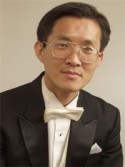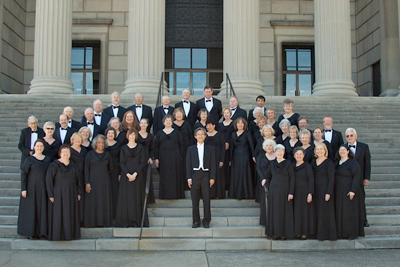by Daniel Hathaway

“As soon as Carl Jenkins finishes a project, he makes a CD with excerpts,” Lee said in a telephone conversation. “I found The Armed Man to be very interesting. I wanted to hear the whole thing. Jenkins’s background is as a jazz musician and the music is fascinating. It sounds complex and intricate but the score is so simple.”
The 13-movement work will be performed by the Dana Symphonic Choir, Stambaugh Chorus and YSU Wind Ensemble on Sunday, May 4 at 6:00 pm in Youngstown’s Stambaugh Auditorium. A film by Hefin Owen will accompany the performance.
Jenkins wrote the mass as a millennium commission from Britain’s Royal Armories Museum — a collection that dates back to the royal arsenal accumulated at the Tower of London since medieval times— which was in the process of being moved to Leeds. “The Armed Man” refers to Jenkins’s use of the cryptic Renaissance tune L’homme Armé (The armed man must be feared), which was embedded by many composers of the era in their so-called “parody” masses. Intending to make the piece both inclusive and thought-provoking, Jenkins added a Muslim prayer and a poem by a Hiroshima survivor about the sin of the atomic bomb.
“The music has so much power,” Lee said. “There are strikingly beautiful melodies and harmonies. The Christie eleison section is in the style of Palestrina and quotes his L’homme Armé mass. Elsewhere you hear the menace of marching soldiers. It ends with the L’homme Armé melody in a major key, symbolizing the ringing in of a thousand years of peace after a thousand years of war.”
As a man who grew up in South Korea, Lee was personally affected by the message of the mass. “All through my childhood I remember the commemorations every June 25 of the beginning of the Korean War in 1950. The media bombarded us day after day with images of war. It left me with the memory of the terrible things war can do.”
Lee, who likes to build meaningful programs that lead people to think, performed the mass last year with his Stambaugh Chorus (above), a community group, accompanied by a community concert band. An audience survey yielded striking comments like “I’ve rarely been so moved by a concert.”
“Our board members thought we should do it again,” Lee said, “but I rarely repeat pieces except Messiah every four or five years for my students’ sake.” But then he realized that certain stars were aligning for 2014, which marks the hundredth anniversary of the beginning of World War I and the seventy-fifth of the outbreak of World War II. “The theme of war and peace works perfectly.” Hae-Jong Lee decided to combine his Dana Symphonic Choir with the Stambaugh Chorus for a total of one hundred voices, and approached Stephen Gage about a collaboration with the YSU Wind Ensemble.
The concert on May 4 will begin with Gage conducting the winds in new pieces by David Morgan (Glory Days) and Stephan Barr (Winter Sky) and in Clare Grundman’s arrangement of Leonard Bernstein’s Slava! Before performing the Jenkins mass, Lee will conduct the combined choruses in Kurt Bestor’s Prayer of the Children, commemorating the conflict in Kosovo — another interesting alignment of events, as that war broke out while Karl Jenkins was writing The Armed Man. He was moved to dedicate the finished work to those affected by that latest outbreak of violence
Published on ClevelandClassical.com May 1, 2014.
Click here for a printable copy of this article.



